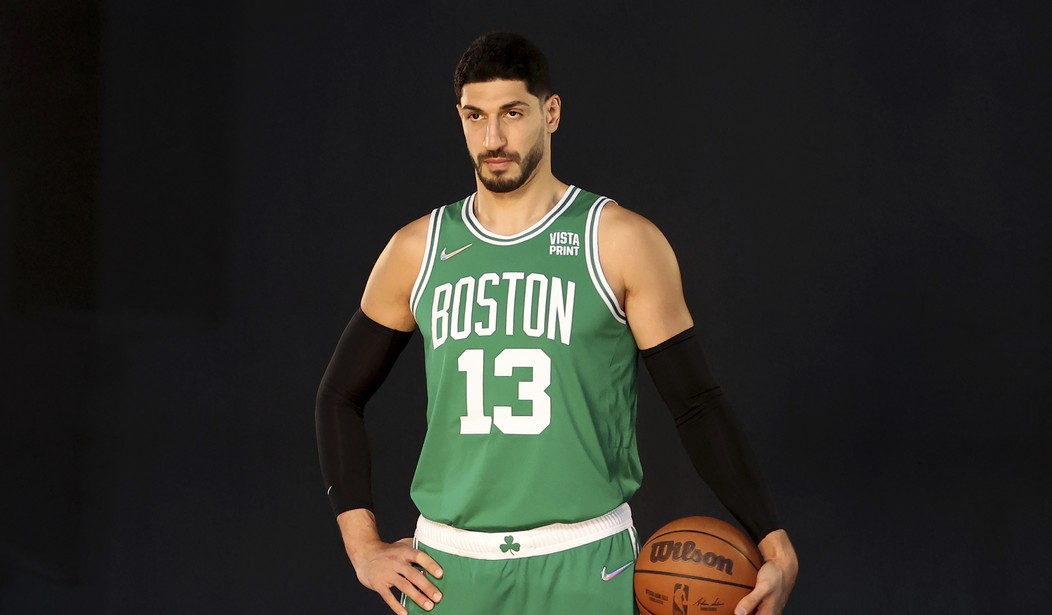Teenage basketball star Enes Kanter was shocked when his teammate criticized President Barack Obama on Facebook.
“Dude, what are you doing?” he exclaimed. He feared his teammate would be jailed.
Kanter is from Turkey, where, as Kanter explains in my new video, people who criticize the president do go to jail.
His teammates laughed at him. “They were explaining to me about freedom of speech, freedom of religion, expression, freedom of protest.”
That inspired him.
When Turkey’s president shut down news outlets, Kanter decided, “I’m going to say something about it.”
He tweeted, wrote op-eds, gave interviews.
Turkey’s authoritarian rulers retaliated. They jailed his father. “They wanted to set an example, this is what happens if you talk against the Turkish government.”
The NBA supported his protest. “(NBA commissioner) Adam Silver texted me twice and said, ‘Whatever you need, we are here for you. Keep doing what you’re doing.'”
But then he criticized China. Slightly. He wrote, “Free Tibet” on his basketball shoes.
“There’s no rule against it,” he says. Other players put “Black Lives Matter” and “I Can’t Breathe” on their shoes. Criticizing America is encouraged by the NBA.
But “Free Tibet” on a shoe was too much. Celtics officials told him to take them off.
He refused. “I was like, I’m not taking them off because it’s literally freedom of speech.”
Actually, it’s not. America’s freedom of speech applies to government. The NBA can legally censor an employee who might cost them money. They did exactly that to Kanter. He didn’t get to play.
It’s clear what the NBA feared. Just minutes after Kanter tweeted a photo of his shoes, China TV banned coverage of Celtics games. But just temporarily.
The Celtics traded Kanter to the Houston Rockets. The Rockets waived him. He’s received no offers from other teams. “I could’ve played another six years,” he says.
He won’t.
Some sports organizations defend their athletes against China’s oppressive rules. When women’s tennis player Peng Shuai accused a Chinese government official of sexual assault and then disappeared for a few days, the Women’s Tennis Association said they would support her even if they lost money.
The NBA won’t.
They could stand up for the right of one player to speak, to peacefully criticize cruelty. It’s reported that the NBA gets 10% of its income from China. The NBA makes billions. They can’t risk 10%?
The NBA’s games are extremely popular in China. Chinese leaders probably would have resumed TV coverage. It’s not in their interest to ban NBA games forever.
“More people watched NBA games in China last year than the American population,” Kanter points out. “I don’t really think that China’s going to ban every NBA game.”
But no one in the NBA supported him. No one in management. No teammate. “Ten years I talk about Turkey. I did not get one phone call. I talk about China one day, me and my manager was getting phone call every hour.”
“The hypocrisy hurts me the most. When it comes to problems happening in America, (the NBA is) the first organization saying, ‘This is wrong. This is what should happen, blah, blah, blah.'”
But silence for victims of torture.
Kanter has now changed his name to “Freedom.” Changed it officially. His real name now is Enes Freedom. “I did it was because I believe the freedom is the most important thing that you can have — after air and water and food. … What kills me is how a Chinese dictatorship can pretty much control a 100% made American company and fire an American citizen from that company.”
Even though Enes Freedom lost a lot, he’s glad he spoke out.
“If God gives you a gift, you can give back to people by standing with them,” he says. “That means so much to people out there who don’t have a voice. If you are not outspoken about some of the issues that are happening, you’re part of the problem.”









Join the conversation as a VIP Member